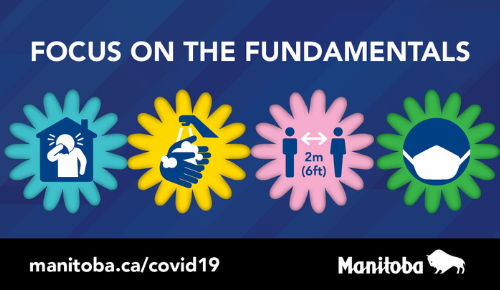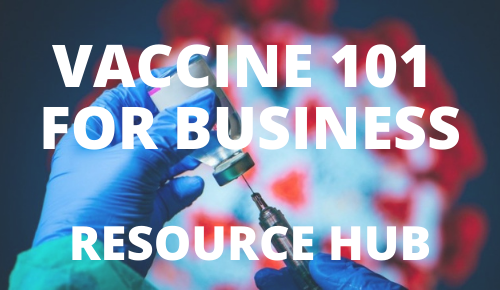In case you tried to tune out COVID-19 news and updates throughout the holiday season, we’ve rounded up everything that was announced or evolved in the past couple of weeks – and it’s a LOT.
As the MCC team came back to work after a planned week-long office closure (punctuated by cancelled holiday gatherings and new year’s plans), we met virtually this morning to talk about what’s next for us. We had been looking forward to hosting our first in-person event on January 27, which we decided to cancel in response to the rise of the Omicron variant in Manitoba, and currently wreaking havoc across Canada.
Just as we have be doing throughout the pandemic, we have been tracking federal/provincial emergency relief announcements during the past couple of weeks. We’ve collected them up here to make sure our members are aware of protocol changes, relief fund launches, important pieces of information related to the variant, rapid testing, vaccines, and more.
- Rapid testing – According to Dr. Jazz Atwal, Manitoba’s deputy chief provincial pubic health officer, “When you go to a testing site, the workers go through a process of analyzing who qualifies for the PCR test. Most people won’t though, and those people will receive rapid tests to take home. Some may qualify for a monoclonal antibody treatment to prevent severe outcomes.” Dr. Atwal shared that more than 500K rapid tests were handed out last week, and they anticipate the same number to be distributed this week.
- Individuals who test positive with a Rapid Antigen Test should assume they have COVID-19 and do not need to get a follow up PCR test to confirm, unless they fall into a specific high risk group or hold a front line responder/health care position. For full details and the list of who must still get a PCR test, please see the link below: https://www.gov.mb.ca/covid19/testing/testing-eligibility.html
- Self-isolation: As a reminder, there now different isolation timelines for vaccinated and unvaccinated individuals. Full details can be found here https://manitoba.ca/covid19/fundamentals/self-isolation.html
- People who are fully vaccinated and do not have symptoms need to isolate for five days from the date of their positive test.
- People who are fully vaccinated and have symptoms need to isolate for five days from the day their symptoms started or the date of the test, whichever is later. They must also continue to isolate until they no longer have a fever and their other symptoms have been improving over the past 24 hours.
- People who are not fully vaccinated need to isolate for 10 days from the date of their positive test. They must also continue to isolate until they no longer have a fever and their other symptoms have been improving over the past 24 hours.
- Meanwhile, this morning, the federal government announced it would begin the distribution of 140 million rapid tests across the country, and the MCC looks forward to making our recommendations to the provincial government with respect to distribution.
- In today’s presser, Dr. Atwal was asked about the team’s analysis to date of Omicron’s severity of outcomes. “The data is really still coming in for us about Manitoba’s experience, and we are still analyzing that data. But, early studies in other jurisdictions have shown decreased severity, with some showing a decrease of 50% and others up to 75% — but we haven’t analyzed all our own data. Over the next few days, we should have better information in relation to Omicron. In the meantime, the Delta variant is still circulating in Manitoba, although most cases are Omicron. There hasn’t been any Omicron found in the Northern Regional Health Authority (NHRA) or First Nations or in Southern Health. Most hospitalizations and ICU stays seem to be Delta.”
- There is currently a limited supply of the Pfizer vaccine. All adults aged 30 years or older will be offered the Moderna vaccine for their first, second or third dose. This will help ensure enough Pfizer remains available for people aged 12 to 29. People under 30 receiving an mRNA vaccine may face an increased risk of myocarditis and pericarditis as a rare side effect. While this was rare after Moderna, it is even more rare after Pfizer. These side effects are rare, temporary, mild and treatable. This means that if only Moderna is available to a young person, it is still safer for them to get the Moderna vaccine than to take the risk of a COVID infection. When both vaccines are available, Manitoba wants to make sure that young people are offered the option that has the lowest risk of myocarditis. People over the age of 30 did not experience the same increased risk of these side effects, regardless of which vaccine they received.
- On December 27, 2021, new public health orders went into effect until at least January 11, 2022. Click here to access an overview of the changes.
- Updates for kids:
- An 8-week interval is recommended by NACI between vaccine doses 1 and 2 for children ages 5 to 11. Dr. Reimer says that, “We do have a clinical guidance document for all immunizers (physicians, pharmacists, etc) and we are updating it as information changes. But for now, this 8-week timeframe is recommeded to be the best timing for protection against COVID-19 balanced with risk.”
- K to 12 schooling has been moved to a remote model for at lest one additional week. Effective Jan. 10, 2022, a phased-in approach will be applied to allow students of critical service workers in kindergarten to Grade 6 and all high-risk students and students with special learning needs in kindergarten to Grade 12 to attend school if no alternate care is available. Current plans are to have all other students return to in-person learning on Jan. 17. Click here to view the annct.
- Provincial government fund updates for businesses: On Dec. 22, 2021, the Province of Manitoba introduced the Sector Support Program to provide up to $22 million in further support for businesses affected by the most recent COVID-19 public health orders. An online assessment tool will be available by the end of the busy holiday period and until Jan. 31, 2022, to help business owners determine their level of eligibility for the Sector Support Program. Businesses such as restaurants, hotels and bars that provide dine-in food services, fitness and recreation facilities, movie theatres, performance venues and museums, can apply for grants based on their number of employees. For details: https://manitoba.ca/covid19/programs/issp.html
- Federal government fund updates for businesses: The federal government has announced an ongoing suite of subsidies to serve as successors to CEWS (periods from March 15, 2020 to Oct 23, 2021). These wage/rent subsidies and hiring supports (Canada Recovery Hiring Program, Tourism and Hospitality Recovery Program, Hardest-Hit Business Recovery Program) are in effect until May 7/2022, and are geared to the hardest-hit sectors and their slower recovery. For details: https://manitobabusinessmatters.ca/federal-government-expands-wage-hiring-supports/
- The government also announced on Dec. 22 that it would expand the Local Lockdown Program to include employers subject to capacity-limiting restrictions of 50 per cent or more; and reduce the current-month revenue decline threshold requirement to 25 per cent. Eligible employers will receive wage and rent subsidies from 25 per cent up to a maximum of 75 per cent, depending on their degree of revenue loss. The 12-month revenue decline test continues to not be required in order to access this support.
- Federal government relief updates for workers: The federal government announced worker benefits to replace the Canada Recovery Benefit (CRB). The Canada Worker Lockdown Benefit offers temporary income support to employed and self-employed people who cannot work due to a COVID-19 lockdown. The CWLB is only available when a COVID-19 lockdown order is designated in a given region between October 24, 2021 and May 7, 2022. For details: https://www.canada.ca/en/revenue-agency/services/benefits/worker-lockdown-benefit.html
- They also extended the Canada Recovery Caregiving Benefit and the Canada Recovery Sickness Benefit until May 7, 2022, and increased the maximum duration of benefits by 2 weeks. This extends the caregiving benefit from 42 to 44 weeks and the sickness benefit from 4 to 6 weeks. People can now apply retroactively to periods between November 21, 2021 and December 11, 2021.




